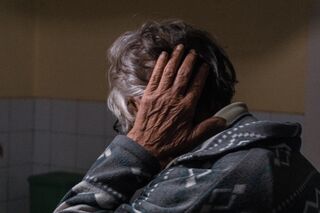Fear
Aging and Migraine: A Few Recent Observations
What changes occur as we age with migraine disease?
Posted September 4, 2022 Reviewed by Jessica Schrader
Key points
- Aging can make us less tolerant of living with migraine.
- We come to realize even more the loss of time of living with chronic illness.
- We can get lost in the worry about the next attack rather than being mindful of the freedom from one.

I had been relatively fortunate with my migraine attacks as of late. Typically, the headache, itself, with my rescue medications, had been lasting only a day ...
That was until a month ago, when I started a nearly four-week intractable attack, one that would not relent, despite my throwing everything I had at my disposal at it.
It wasn’t always full-blown; the fierce attacks were intermingled with functional days and some days where the pain, itself, stayed in the neck. However, during this period, all of my other migraine symptoms remained—extreme fatigue and lack of energy, irritability, brain fog, word drop, weakness, and that full-body feeling of being generally unwell.
What I discovered during this period is that as I age (I had my first migraine when I was 14 and am now 59), I have less and less tolerance for these long-term attacks. Not that I ever had a lot of acceptance, but losing a month out of my life is harder to live with now, as is the fear that I’m never going to get out of a long cycle. Day after day, awakening with “it” still there.
A positive I also relived, though, was first the indescribable joy when the cycle does lift after a month and the monster leaves my whole being:
“…the ecstasy of waking up and knowing right away that the migraine cycle has broken; I lift my head on these days feeling like a real force has moved out of my brain and body; suddenly, I’m me again…I never have more gratitude and mindfulness than I do when I experience this “lift.” I pay attention to all the beauty of the day, and I have energy because now I can live rather than exist—at least for this moment” (O’Shea 106).
I wanted to get up, wanted to do basic chores and work inside and outside, and wanted to see friends and family.
Another problem that has worsened, however, as I have aged is how quickly and fiercely the fear of its return plagued me and still does, almost a week later. I’d always understood the "fear of return": “But, migraine waits for me. What if I try to do too much? What if it comes back? No, when will it come back? A turn of the head, a jarring movement, a time of stress, staring into the computer screen too long. Chronic migraineurs live with this fear” (O’Shea 106).
However, this time was so intense and consuming that I was almost looking for signs of return. If I woke up feeling good, I was still frightened to schedule anything later in the day, afraid my condition would change. A part of me even wanted to take one of my medications to preclude a possible attack.
A study in The Journal of Headache and Pain examined the relationship between cephalalgiaphobia and migraine. Cephalalgiaphobia, which is "the fear of having a headache attack during a pain-free period that may induce patients to use analgesic in the absence of pain to prevent headaches and to improve their performances," has long concerned doctors, as there appears to be a link to medication overuse to mitigate the fear. The above-mentioned study concluded that, “Further studies are necessary in order to investigate extensively the relationship in terms of causality between cephalalgiaphobia and increase in migraine frequency” (Giannini et. Al).
How can I help myself the next time around?
- Pay close attention to my medication use, keeping potential overuse in mind, realizing the potential for a vicious circle and actually causing a return.
- Share with family and friends these fears so they better understand the full range of what I experience after a vicious and long-term attack.
- Be present with the reality and reasons for these fears but, too, not overmedicate and not let the fear overpower me.
After all, as the days go on without an attack, the fear does abate. As I get older, I want to stay present, stay with that sensational feeling of freedom from the disease, rather than worrying about what the future will bring.
Fear keeps us focused on the past or worried about the future. If we can acknowledge our fear, we can realize that right now we are okay. Right now, today, we are still alive, and our bodies are working marvelously. Our eyes can still see the beautiful sky. Our ears can still hear the voices of our loved ones.
--Thich Nhat Hanh
References
Giannini G, Zanigni S, Grimaldi D, Melotti R, Pierangeli G, Cortelli P, Cevoli S. "Cephalalgiaphobia as a feature of high-frequency migraine: a pilot study. "J Headache Pain. 2013 Jun 10;14(1):49. doi: 10.1186/1129-2377-14-49. PMID: 23759110; PMCID: PMC3686604.
O’Shea, Kathy. “I Know Upon Awakening.” So Much More than a Headache: Understanding Migraine through Literature.” Kent State University Press. August 2020. 101.


